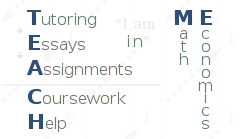Section 1.7: Compactness and Effectiveness
Compactness Theorem
A set of wffs is satisfiable iff every finite subset is satisfiable.
Given a set
of wffs that is finitely satisfiable, extend it recursively by including each possible wff (there are countably many) or its negation depending on which one makes the extended set finitely satisfiable at each step. Then, the resulting set
contains
and all wffs or their negations, and is finitely satisfiable. Now, for each sentence symbol
we assign
iff
is in the extended set (i.e.
iff
is in the extended set; both
and
cannot be there, as it would make
an unsatisfiable finite subset of
). Then,
satisfies a wff iff it is in
.
If
, then there is a finite subset
s.t.
.
- In fact, the corollary is equivalent to the Compactness Theorem, that is the truth of the latter can be shown if the truth of the corollary is assumed.
Effectiveness and Computability
A set of expressions
is called decidable iff there is an effective procedure that, given an expression, will decide whether it belongs to
or not.
A set of expressions
is called effectively enumerable (semidecidable) iff there is an effective procedure that, given an expression, produces a positive answer iff it belongs to
.
- A set of expressions is effectively enumerable iff there is an effective procedure that lists all the members of .
- The Parsing Algorithm of Section 1.3 ensures that the set of wffs is decidable.
-
(Kleene’s Theorem) A set of expressions
is decidable iff both it and its complement are effectively enumerable.
- The class of effectively enumerable sets is closed under union and intersection.
- The class of decidable sets is closed under union, intersection and complementation.
A function
is effectively computable (or simply computable) iff there is an effective procedure that, given any
, produces
.
Decidability of tautological consequences
-
The truth table procedure of Section 1.2 ensures that there is an effective procedure to decide whether
for a finite
.
- In particular, the set of tautological consequences of a finite set is decidable.
- The set of tautologies is decidable.
-
If
is infinite, even if decidable itself, the set of its tautological consequences may not be decidable.
- If is effectively enumerable, the set of its tautological consequences is effectively enumerable as well (follows from compactness).
- If is effectively enumerable, and such that for any , or (in either exclusive or inclusive meaning of “or”), then the set of its tautological consequences is decidable.
Completeness
These facts are more important for the first-order logic and will reappear in Section 2.4.
Define a deduction from
to be a finite sequence
of wffs such that for each
one of the following holds:
,
, or there are
:
(
is obtained by modus ponens from
and
).
- .
- If , there is a deduction from .
